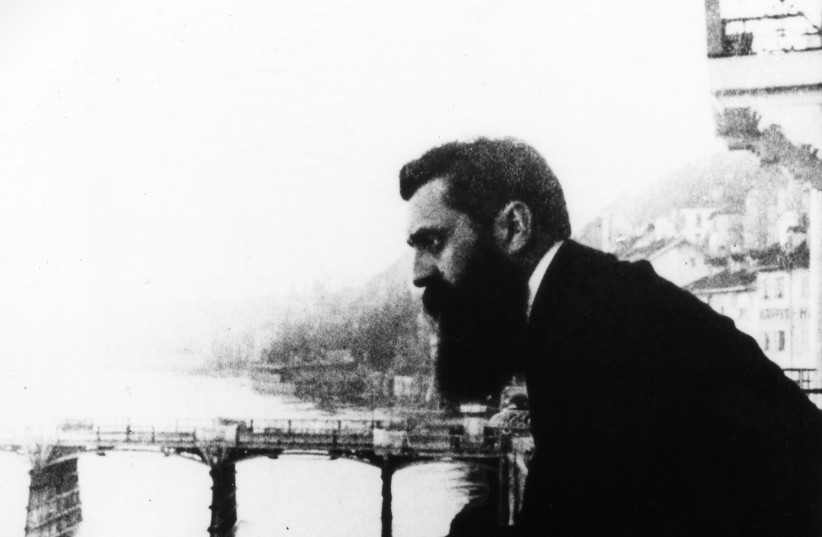Controversy has arisen over the Israeli government’s recent decision to temporarily prevent non-Israelis from entering the country due to the ongoing COVID-19 crisis.
American businessman Martin Oliner (writing in The Jerusalem Post on January 1) recalled that Theodor Herzl cited the “distress of the Jews” in explaining the need for a Jewish state in his 1896 book, DER JUDENSTAAT. Today, according to Oliner, “Jews around the world are once again in distress,” this time because of the Israeli travel restrictions.
It’s certainly unfortunate that many diaspora Jews are temporarily unable to attend family events in Israel or complete business deals with their Israeli partners. But if one surveys the suffering that Jews were enduring in the 1890s, at the time Herzl was writing his book, do they really find a basis for comparing it to the distress that some contemporary diaspora Jews are experiencing?
In Tsarist Russia, discrimination and violence against Jews reached such high levels that US President Benjamin Harrison, in his annual message to Congress in 1891, denounced “the severe and oppressive civil restrictions… [and other] harsh measures now being enforced against the Hebrews in Russia,” as a result of which, he forecast,“over a million [Jews] will be forced from Russia within a few years.” Konstantin Pobedonostsev, adviser to the Tsar, reportedly remarked in 1894 that one-third of Russian Jews should leave the country, one-third should become Christians and one-third should die.
In The Russian Jew Under Tsars and Soviets, the eminent historian Salo Baron found that after the ascension to power of Tsar Nicholas II, in 1894, “the old screws of legal and administrative discrimination [against Jews] were turned more tightly.” The quota on Jews admitted to Russian universities and colleges was lowered from seven percent to three percent and the number of Jewish paupers in Russia grew by twenty-seven percent from 1894 to 1898. “In many communities fully fifty percent of the Jewish population depended on charity,” Baron wrote. Discriminatory legislation (the infamous May Laws) was partially extended to Russian-occupied Poland in 1891, deepening the misery of Polish Jewry.


In Germany, there was a massive surge of antisemitism in the 1890s, ranging from blood libel trials from 1891-1892 to a series of electoral victories for Jew-haters. The number of openly antisemitic deputies in the Reichstag increased to five in 1890 and to sixteen in 1893, and the Conservative Party became the first major political party in modern Germany to embrace antisemitism, vowing to “fight the multifarious and obtrusive Jewish influence that decomposes our people’s life.”
The rising tide of antisemitism prompted German Jews to create defense groups, such as, the Association for Defense Against Antisemitism (1890), the Association for Defense Against Antisemitism (1892), the more assimilationist Central Association of German Citizens of Jewish Faith (Central-Verein Deutscher Staatsbürger jüdischen Glaubens) 1893, and, because of campus antisemitism, the Confederation of Jewish Fraternities (1896).
Herzl was particularly troubled by events in France and Austria, where he had lived since his teens. The Dreyfus Affair, which Herzl followed closely, began in 1894, culminating in mass anti-Jewish riots in Paris in 1898. In Austria, the openly antisemitic Karl Lueger became mayor of Vienna in 1895 and was repeatedly re-elected. Adolf Hitler later cited Lueger as a source of inspiration.
This snapshot of the distress suffered by some major diaspora Jewish communities in the 1890s is obviously quite different from what Jews in the Five Towns or Beverly Hills are experiencing today.
This is not to minimize the unhappiness of those who have missed family celebrations or whose academic conferences have had to be conducted via Zoom. But the history of the Jewish people is filled with all too many instances of life-or-death distress. Careless historical comparisons contribute little to the public conversation concerning temporary travel restrictions to Israel.
The writer is the author of more than 20 books on Jewish history and Zionism, and coauthor of The Historical Dictionary of Zionism.
